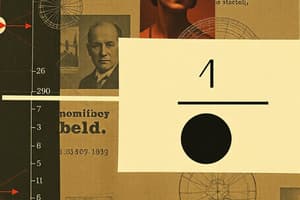Podcast
Questions and Answers
What is the sum of the fractions $\frac{3}{5}$ and $\frac{2}{7}$?
What is the sum of the fractions $\frac{3}{5}$ and $\frac{2}{7}$?
- $\frac{31}{35}$ (correct)
- $\frac{29}{35}$
- $\frac{5}{12}$
- $\frac{1}{2}$
Which of the following is the least common denominator of the fractions $\frac{3}{5}$ and $\frac{2}{7}$?
Which of the following is the least common denominator of the fractions $\frac{3}{5}$ and $\frac{2}{7}$?
- 15
- 10
- 35 (correct)
- 12
If $\frac{3}{5}$ is converted to have a denominator of 35, what is the equivalent fraction?
If $\frac{3}{5}$ is converted to have a denominator of 35, what is the equivalent fraction?
- $\frac{18}{35}$
- $\frac{24}{35}$
- $\frac{21}{35}$ (correct)
- $\frac{15}{35}$
What would be the first step in adding the fractions $\frac{3}{5}$ and $\frac{2}{7}$?
What would be the first step in adding the fractions $\frac{3}{5}$ and $\frac{2}{7}$?
When adding $\frac{3}{5}$ and $\frac{2}{7}$ after finding the common denominator of 35, what are the new numerators?
When adding $\frac{3}{5}$ and $\frac{2}{7}$ after finding the common denominator of 35, what are the new numerators?
Flashcards are hidden until you start studying
Study Notes
Adding Fractions
- To add fractions, find a common denominator to combine them effectively.
Sum of Fractions
- The sum of the fractions (\frac{3}{5}) and (\frac{2}{7}) can be computed by finding a common denominator and adjusting the numerators accordingly.
Least Common Denominator (LCD)
- The least common denominator of (\frac{3}{5}) and (\frac{2}{7}) is 35. This is the smallest multiple that both denominators (5 and 7) share.
Conversion to Equivalent Fraction
- Converting (\frac{3}{5}) to a denominator of 35 involves multiplying both the numerator and denominator by 7, resulting in the equivalent fraction (\frac{21}{35}).
First Step in Adding Fractions
- The initial step in adding (\frac{3}{5}) and (\frac{2}{7}) includes finding the least common denominator (LCD) to create fractions with a shared base.
New Numerators After Finding Common Denominator
- When adding the fractions with a common denominator of 35, the new numerator for (\frac{3}{5}) is 21; for (\frac{2}{7}), it is 10, resulting in the adjusted fractions (\frac{21}{35}) and (\frac{10}{35}) respectively.
Studying That Suits You
Use AI to generate personalized quizzes and flashcards to suit your learning preferences.




